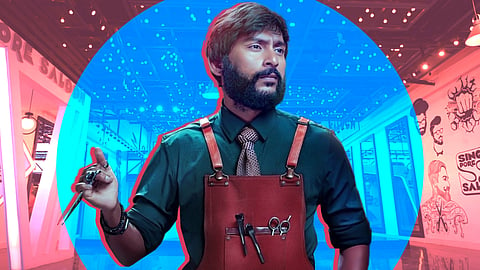
- Reviews
- Power List 2024
- Cannes 2024
- In-Depth Stories
- Web Stories
- News
- FC Lists
- Interviews
- Features
- FC SpecialsFC Specials

Writer and Director: Gokul
Cast: RJ Balaji, Kishen Das, Lal, Sathyaraj, Meenaakshi Chaudhary
Duration: 137 minutes
Available in: Theatres
There is a lot to love about Gokul’s Singapore Saloon. A lot. The little details he leaves with different film posters, the on-point casting, the beautiful echoes of important dialogues, the way the film spends time establishing the bonds between characters, the touch of magical realism and saving the best for the last, Gokul’s skill of writing fine stretches of comedy that leaves you in stitches. BUT (sadly yes, there is a but) the film traverses in different directions in the second half, taking a melodramatic route where the stakes are suddenly very huge and threatening, and the solutions, convenient and predictable.
Kathir (RJ Balaji) and Basheer (Kishen Das) are childhood best friends. We go back in time to see their younger versions who are in awe after seeing Chacha’s (Lal) magic, who is the famous barber in their village. When they see how Chacha changed the look of a beggar and how people started respecting him (The barber shop wall features Vijay’s Minsara Kanna (1999) poster), Kathir admires how much a hairstylist can do. “A hairstylist can change the way the world looks at a person,” Kathir says. He falls in love when he is in his eighth standard (And the wall now features an Alai Payuthey (2000) poster). The wall becomes an important space because a few months later, Kathir and Basheer tear up the movie posters and instead draw a swag image of Chacha which later gets a beautiful echo. This whole stretch that details their childhood is long drawn but one joke after another keeps landing, and you don’t mind watching these mischievous kids for some more time. This same logic applies to many other stretches in the film where the scenes may not contribute much to the bigger picture but they tickle your funny bone, so you are just enjoying that moment.
And it also slowly draws you into their world. So, when Kathir or Basheer decide to take EEE instead of Computer Science on a whim, you aren’t surprised. When Kathir gets married, you don’t require a separate love track to see how much Kathir and Nila (Meenakshi Chaudhary) mean to each other. Or when you are randomly introduced to Nila’s father (a brilliant Sathyaraj) or her brother-in-law (Robo Shankar) and the former begins to take centre stage, you don’t find it jarring. Instead, the combination of Sathyaraj, Robo Shankar, RJ Balaji and Kishen Das is so much fun which gets its full payoff during the pre-interval stretch and you wish the film stayed in that space.
When his son gets dumped, a father says, “I will drive, you sit in the back,” and there is a certain comfort that we feel, along with the character. When Sathyaraj is pissed off because of his sons-in-law (RJ Balaji and Robo Shankar), you just know they are family. Watch the scenes where Sathyaraj realises Kathir’s passion but is unable to accept it because of his ego and how he later goes back to being a miser at the slightest of troubles; both varying emotions captured through an open door. Robo Shankar offers more to the character that makes his role memorable and so does Meenakshi Chaudhary. The little cameos by Imman Annachi and YG Mahendran add more fun. Apart from RJ Balaji and Sathyaraj, another person who benefits from the nuanced writing and equals the arc with their performance is Kishen Das as the ever-dependable, caring best friend Basheer.
All these little things that the film keeps offering you in the most humours way possible are Singapore Saloon’s biggest strength. However, the film begins to pull you out of this comfort space. And that’s not wrong. But where it takes you instead is the problem. The small dreams and smaller joys are suddenly swapped for bigger issues and bigger worries. Again, this genre shift isn’t the entire issue either. It’s completely plausible that you or I could be put in the same situation as Kathir where his dreams literally crash in front of his eyes. So what would you do then? The answers to his issues become more convenient and contrived.
When someone like a God appears out of nowhere (there is even always a bright light glowing behind him) and changes the way Kathir looks at his sufferings, the touch of magical realism puts a smile on your face. But when a pregnant woman is suddenly in labour pain and Kathir helps her, you have already seen it several times before and the situation feels more contrived than emotional. When the protagonist you have seen so far is in deep waters, suffering the biggest hurdle he has ever faced, instead of taking us closer to him, the film decides to skip, as the words “After a few months” play on screen.
When he sees a ray of hope, there are moments you would like to take back home, like how there is a beautiful echo of the first dialogue “A hairstylist can change the way the world looks at a person” but to get there, the film deviates a lot more than you would expect. A film that felt very personal resorts to usual commercial means to get home the point of Kathir achieving his big dreams. So when he finally achieves, you are happy for him but your heart isn’t jumping with the usual hope and elation that his success should essentially leave you with.
It’s a good hairstyle. Just not the one that gets you all excited.
Watch The Official Trailer of Singapore Saloon